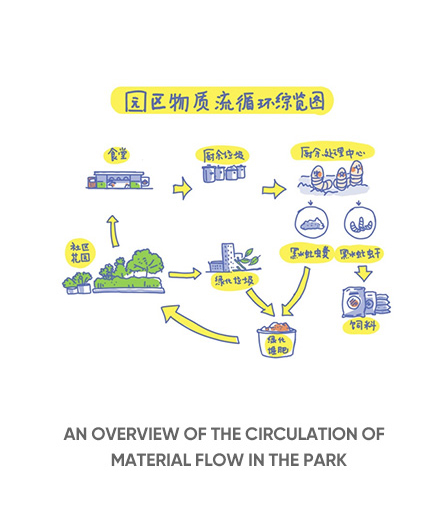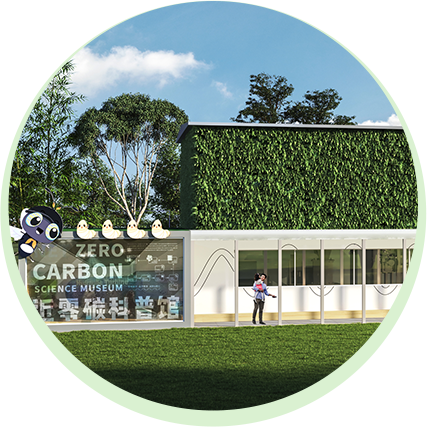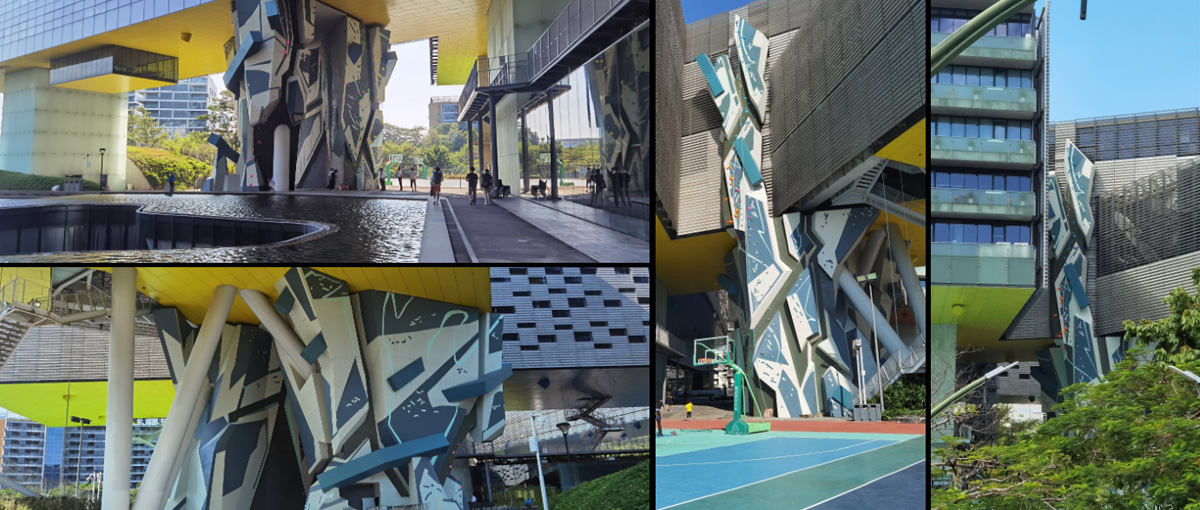- On-site Recycling
of Organic Wastes by
Black Soldier Flies - Low-Carbon
Technology Fuels the
Sustainable Community - Organic Recycling
for a Low-Carbon
Eco Garden
-
200kilograms
It is a cakewalk for them to process 200 kilograms of kitchen waste daily at the Dameisha Vanke Center
-
64.7tons
Black soldier fly larvae help the center reduce 64.7 tons of CO2e annually
-
100%
100% of kitchen waste at the Dameisha Vanke Center is now recycled on-site
-
73tons
with a capacity to process 73 tons of kitchen waste annually
Effective waste management in communities is a key link in achieving carbon peaking and carbon neutrality goals. In this regard, Meisha Carbon-Neutral Community has spearheaded the on-site recycling of kitchen waste. Vanke Foundation introduced the innovative approach of kitchen waste processing by black soldier flies: These tiny black soldier fly larvae can consume kitchen waste 200,000 times their weight in just 8 days. It is a cakewalk for them to process 200 kilograms of kitchen waste daily at the Dameisha Vanke Center. Black soldier fly larvae help the center reduce 64.7 tons of CO2e annually, equivalent to planting 647 trees. They are the community’s rock stars for carbon reduction.
The black soldier fly, Hermetia illucens (Insecta: Diptera: Stratiomyidae), is a quiet, clean insect that offers an amazing skill: it converts and decomposes organic waste such as animal manure and kitchen scraps. Research has shown that for every ton of kitchen waste they consume, black soldier flies produce around 200 kilograms of fresh insect protein and 250 kilograms of insect frass. This helps us effectively process China’s kitchen waste, which features a high oil and salt content. In November 2019, the Dameisha Vanke Center introduced equipment and services for breeding black soldier flies to process kitchen waste ecologically and on-site.
The larvae consume kitchen waste and produce frass, which, when mixed with fallen leaves and branches through fermentation for 28 days, generates fertile black soil. The “nutrient soil” acts as natural organic fertilizer, nourishing plant growth in rooftop gardens in the community. Thanks to the black soldier flies, 100% of kitchen waste at the Dameisha Vanke Center is now recycled on-site, with a capacity to process 73 tons of kitchen waste annually. The center produces 50 kilograms of insect frass, which is used for composting in the community or directly utilized for fertilization. Every day, 40 kilograms of black soldier fly larvae are produced, with some used as feed for pond fish and the rest processed and distributed as animal feed after freezing.


In 2023, Vanke Foundation founded the Net-Zero Carbon Science Museum jointly with the Yantian Administration of the Shenzhen Municipal Ecology and Environment Bureau and the Urban Administration and Law Enforcement Bureau of Yantian District. This facility can process up to three tons of kitchen waste daily, with an estimated annual reduction of 970.5 tons of CO2eq, equivalent to planting over 7,000 trees. It advances the on-site recycling of organic waste in the community, reduces carbon emissions generated during waste transport and processing, and helps Yantian District and Shenzhen achieve their carbon peaking and carbon neutrality goals with pioneering practices. In addition, Vanke Foundation worked with Huazhong Agricultural University and Jichuan Communication for the release of the Black Soldier Fly Picture Book, raising public awareness about the environmental impact of kitchen waste, the positive role played by black soldier flies, and their potential in industries such as agriculture, animal feed, and bioenergy. The picture book is now recommended to the public as a popular science publication through pilot community projects such as the Dameisha Vanke Center and Beijing Vanke Xishan Courtyard, as well as government departments, private companies, social organizations, schools, and more.
Vanke Foundation is developing more methods of organic waste processing by black soldier flies. We expect to encourage more communities to adopt nature-based solutions for organic waste recycling by measuring carbon reductions and generating carbon assets through scientific means. Our effort aims to facilitate on-site waste recycling, drive sustainable community development, and contribute to China’s carbon peaking and carbon neutrality goals.
Dameisha Vanke Center, nestled at the heart of the Meisha Carbon-Neutral Community, was founded in 2009 with a commitment to green, sustainable goals. The center fully blends buildings and technologies with nature through six aspects, including the external shading system, natural ventilation and lighting, rooftop PV system, rainwater collection system, the use of eco-friendly materials across all scenarios, and greenery in open spaces. In 2022, these low-carbon facilities were upgraded, with the adoption of a full HVAC system and more efficient server room, resulting in a 55% reduction in energy consumption. The rooftop solar panels were also replaced, tripling the clean energy generation. As a result, the extensive rooftop PV system, coupled with seamlessly integrated renewable energy, eco-friendly construction materials, and digital energy, has pushed the center’s energy efficiency to 85%, with 100% green energy usage during operation. Government authorities are also promoting the expansion of rooftop PV systems, as they transform public areas like outdoor parking lots into sources of solar power. More electric vehicle charging stations have been installed in the community to meet the demand for low-carbon transport among both residents and visitors. All of this makes Meisha a genuine green tourism destination.


Community composting represents one of the vital low-carbon pathways at Meisha Carbon-Neutral Community. In the community, black soldier fly frass and green waste are mixed in an optimal proportion for composting. After a month of fermentation, the mixture is transformed into organic humus that enriches soil quality. These nutrient-rich fertilizers have breathed life into Meisha’s gardens and multiple co-built community gardens, providing ample nourishment for the plants. With its circular model of “Black Soldier Fly - Community Composting - Co-built Gardens”, the rooftop garden at the Meisha Vanke Center was recognized as one of the first series of Shenzhen’s top ten co-built gardens. Over the past two years, community composting has contributed to a 50% cut in chemical fertilizer usage and achieved 100% on-site recycling of kitchen waste and 40% of green waste.
Garden Together: Community Gardens Co-built by Residents
Initiated by the Urban Administration and Law Enforcement Bureau of Yantian District and Vanke Foundation in late 2022, the co-built garden program gathered senior experts, private players, and community organizations. Through 30+ workshops held in more than three months, five co-built gardens were set up with the enthusiastic support of more than 300 Yantian residents. Notably, these unique co-built gardens are designed and cultivated by community residents themselves.
“Garden Together” was the theme for these co-built gardens in the first year. Focusing on this theme and the unique features of each garden, the project team created a pair of endearing mascots, Grandma Flowers and Buggy, to accompany citizens, as they enjoy the beauty of the gardens.



